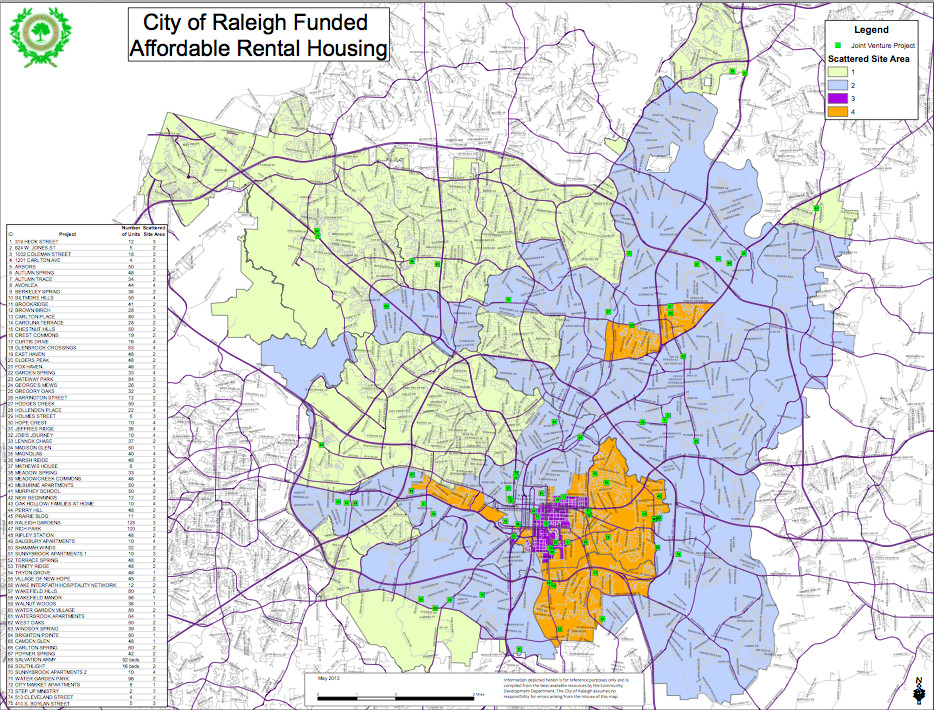Last-minute opposition from residents has put a decision on hold for a Southwest Raleigh affordable housing community and prompted two special meetings in order to meet state application deadlines.
Residents from the Camden Crossing Homeowners Association said they found out about the possible project late last week after a Council committee gave approval for joint venture funding.
In order to hear from the neighbors, Councilors agreed to discuss some of their issues in a special Comprehensive Planning Committee meeting at 10 a.m. Friday. The full Council will come back for a final vote the following Tuesday at 10 a.m. so that DHIC, the developer of the project, can meet an application deadline for state tax credits.
Councilor Eugene Weeks voted against the motion.
In the interim, DHIC is supposed to meet with area residents.
DHIC, one of the city’s main affordable housing developers, intends to build a 48-unit rental apartment at 2904 Tryon Road for families who make less than 60 percent of Raleigh’s average median income.
In late April, the Budget and Economic Development Committee approved $750,000 in loan funding for the project.
No one spoke in opposition to the development at that meeting.
Ben Kuhn, an attorney representing the neighborhood, said the project should be evaluated by the Comprehensive Planning Committee to ensure that it will meet all of the 2030 Comprehensive Plan guidelines.
Kuhn said it’s not that the neighbors don’t want the project in their community, but they want it to be reviewed against the Comprehensive Plan to make sure that it is a good fit for the area.
City staff used the Scatter Site Housing Policy as part of the evaluation process. The policy ranks areas of the city for affordable housing. Areas with little affordable housing are rated higher than those with established affordable housing communities. The project would fall in a priority two area.

Areas deemed priority one are those in which more affordable housing can be built. A priority four area already includes multiple affordable housing communities and as such is considered a less desirable location for new projects.
Community Development Director Michele Grant said as part of the evaluation process, staff considered the fact that there are already a few affordable housing developments in the area, but the project had high marks in all other categories.
Councilor Russ Stephenson said he had issues with the fact that DHIC did not meet with the neighborhood. Because the property doesn’t have to be rezoned, meaning that an affordable housing project is an acceptable use for the property, DHIC is not required to meet with the neighborhood.
Grant said developers are always encouraged to have meetings with the neighborhood.
DHIC president Gregg Warren said DHIC often meets with the community once a project is further along in development so that specific issues can be taken up at the design stage. Because DHIC hasn’t secured funding for the project, it is possible that it will never be built.
Warren touted DHIC’s reputation for building high-quality housing, often in priority one areas.
Policy Debate
Councilors hotly debated whether to hold two additional meetings.
While some, such as Stephenson and Mayor Nancy McFarlane wanted to give DHIC more time to meet with the neighborhood and to have a broader discussion on the scatter site policy, others said it was unfair to hold up one project to discuss policy.
“I don’t feel that it’s appropriate to hold this applicant hostage so we can analyze policy,” said Councilor Bonner Gaylord, a member of the Comprehensive Planning Committee.
Gaylord said he doesn’t have a problem with reviewing the scatter site policy and having a broad discussion on how it has been implemented, but said he didn’t think it was right to change the rules in the middle of an application.
Councilor John Odom said he took issue with the fact that the application for funding was coming so close to other deadlines, not giving the Council any flexibility to review the case.
Odom also said that if the case was going to be approved anyway, they were wasting everyone’s time by putting it into committee.
Councilor Thomas Crowder, who represents southwest Raleigh, was not at Tuesday’s meeting. Stephenson reported that Crowder was adamant that the Councilors discuss the policy and how it relates to his district’s goals.
Meanwhile, Councilors approved funding for a second affordable housing community in a priority two location in North Raleigh.
Councilor Mary-Ann Baldwin, a supporter of the DHIC development, asked if this second project, by Evergreen Construction, went through the same process as the previous application.
Grant confirmed that it did.
“That’s so hypocritical,” Baldwin charged and asked why this project was not put through the same rigors as the DHIC application.
McFarlane said it was because no one spoke in opposition to it.